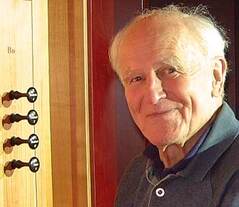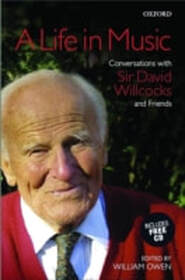A Life In Music -
Conversations With Sir David Willcocks And Friends
edited by William Owen; published OUP
ISBN 978-0-19-336063-1
Available from Allegro Music
ISBN 978-0-19-336063-1
Available from Allegro Music
|
The work of Sir David Willcocks — as conductor, adjudicator, composer and, administrator is known wherever people sing. Recordings made with the choir of King's College, Cambridge, the Bach Choir and others from the 1960s onward set standards that many consider unequalled, certainly unsurpassed. Since his official retirement in 1984 he has appeared as guest conductor in many countries.
William Owen presents a portrait of Sir David and his work through a series of recorded and transcribed interviews, each considering one aspect of his career; Chorister at Westminster Abbey; Organ Scholar at King's Cambridge; Organist successively of Salisbury and Worcester cathedrals - the latter with its prestigious Three Choirs association; back to King's as Director of Music and then to the Royal College of Music, again as Director. There are also sections on his schooldays, war-service (he won the Military Cross) and what may loosely be described as his retirement - for much of which he has worked as hard as ever he did. |
The conversations are interspersed with chapters of reminiscences from people who knew or worked with DW. Musicians, eminent and humble, are joined by administrators, recording engineers, business leaders, friends and members of the Willcocks family. This procession is led by HRH the Prince of Wales, who writes a Foreword - a rare honour. The Prince remarks, as do many others, on Sir David's modesty. We must be thankful to William Owen; this modesty will almost certainly ensure that no autobiography will ever appear.
If modesty is one thread that recurs frequently, Sir David's perfectionism is another - the hall-mark of his recordings. Steely determination is wrapped in the thickest of velvet gloves; sympathy, understanding, courtesy and a sense of humour combine in happy working relationships. A lovely instance occurs in one of DW's own recollections of great figures from the past. Sir Malcolm Sargent, who dominated the world of choral singing for half the twentieth century, was “a very conceited man” - Sir David's own words are by no means an overstatement. The tale of how Sargent's patronizing of the young DW was reversed - with delightful humour - appears on page 124 and alone is worth the price of the book! Sargent, who made enemies rather easily, remained on excellent terms with DW.
The 33 tracks on the CD accompanying the book include many transcribed from LPs made at Kings 40 years ago - including Allegri's Miserere - and extracts from the interviews on which the book is based.
This is a most enjoyable volume to read - and to listen to. It will appeal enormously to both older and younger generations of its subject's admirers.
If modesty is one thread that recurs frequently, Sir David's perfectionism is another - the hall-mark of his recordings. Steely determination is wrapped in the thickest of velvet gloves; sympathy, understanding, courtesy and a sense of humour combine in happy working relationships. A lovely instance occurs in one of DW's own recollections of great figures from the past. Sir Malcolm Sargent, who dominated the world of choral singing for half the twentieth century, was “a very conceited man” - Sir David's own words are by no means an overstatement. The tale of how Sargent's patronizing of the young DW was reversed - with delightful humour - appears on page 124 and alone is worth the price of the book! Sargent, who made enemies rather easily, remained on excellent terms with DW.
The 33 tracks on the CD accompanying the book include many transcribed from LPs made at Kings 40 years ago - including Allegri's Miserere - and extracts from the interviews on which the book is based.
This is a most enjoyable volume to read - and to listen to. It will appeal enormously to both older and younger generations of its subject's admirers.
David Bridgeman-Sutton 2008



